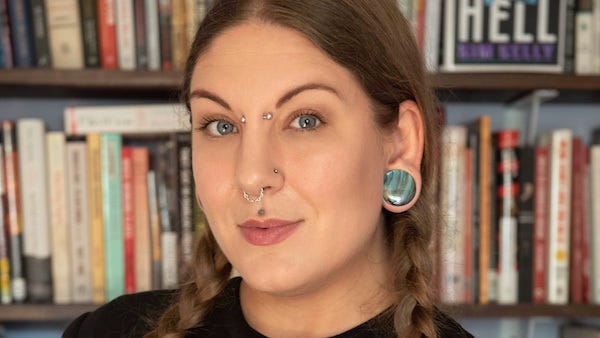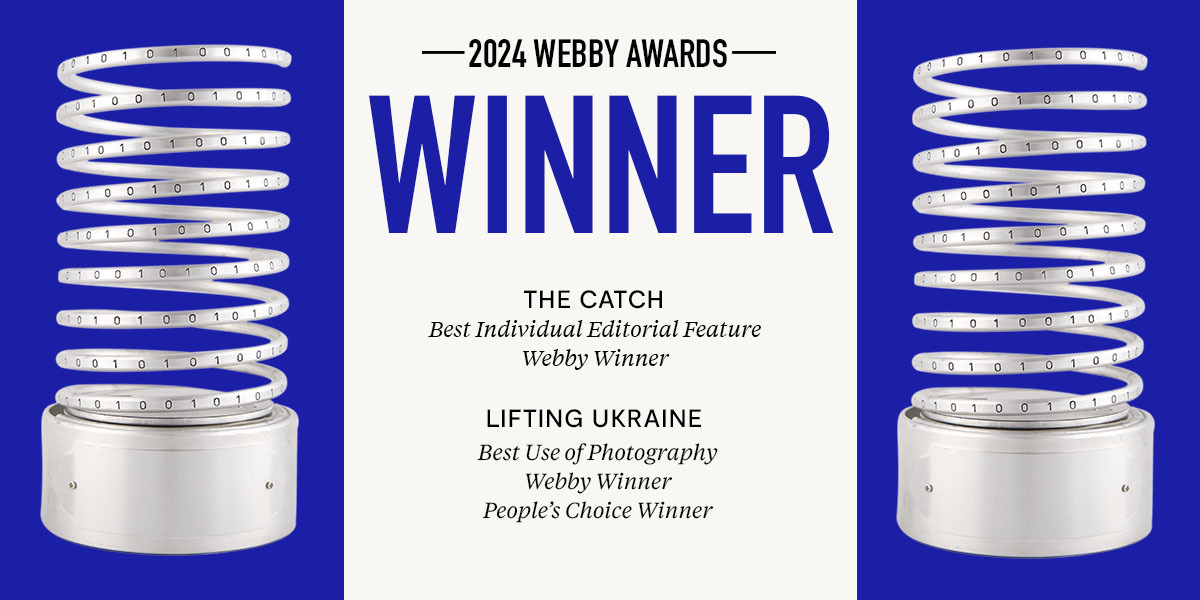Kim Kelly: “I come from a world where if something sucks, you just say that it sucks.”
The veteran metal and labor journalist isn’t afraid to speak her mind on everything from coal mining to Kid Rock.
Journalist Kim Kelly covers two distinct beats: the labor movement and heavy metal. But those subjects, she argues, aren’t as different as you’d think. “The two are linked so strongly, not just in my own personal interest and experience, but just in the way that they exist in the world,” Kelly, the author of 2022’s Fight Like Hell: The Untold History of American Labor, tells Depth Perception.
“What are global, historically rich, collective phenomena that millions of people care about and love and invest their time in, that a broad swath of the population has no interest in or no knowledge of? Heavy metal and the labor movement,” she says, speaking by phone from her home in Philadelphia. “They’re both predominantly working class institutions.”
Kelly now covers labor as a contributor to the progressive publication In These Times and a columnist for both Teen Vogue and Fast Company. She’s also working on a young reader’s edition of Fight Like Hell, due out next year. On the music front, she just launched the metal newsletter Salvo, which features artist interviews and profiles and “a monthly news roundup called Reaper’s Digest.”
Kelly recently took time out of her busy schedule to answer Depth Perception’s Leading Questions. The following interview has been edited for length and clarity. —Mark Yarm
Why did you become a journalist?
I was always interested in the bigger world outside of me, because I’m from a really, really rural place. I grew up in a nature preserve, basically, in rural South Jersey. So I didn’t see very much of the outside world until I was 18 and I got to go to college. I had always wanted to be a writer, and I started writing about music pretty early. I’ve been publishing since I was 15. I wrote for my county newspaper and then for webzines, as we called them.
I began working at Vice in 2014, and in 2015 we started getting involved in organizing a union there. That really caught my interest, and it lined up with the political organizing I was also doing at that time. And I felt myself kind of drifting, not away from metal, but more strongly towards labor, and decided to try to start writing about that.
What story of yours are you proudest of?
At Vice, I wrote about this movement in Sweden, among women in the metal scene, called #KillTheKing, which was inspired by the #MeToo movement. And just talking to these women and hearing about their experiences was really personally validating for me, because I’ve gone through a lot of pretty ugly things as someone who started covering music as a teenage girl. It was just really inspiring to see my people standing up and taking part of this global wave of reckoning over sexual violence and sexual harassment and sexual inequality. And I made a little bit of a splash in the metal world.
And if I can be greedy and add another one, I’m still really happy and proud of the investigation I did for In These Times magazine about the black lung epidemic in Central Appalachia. It was a big, intense story that took me months to do. And when it came out, it mattered in a way that I had not really had a quantifiable way to measure with a lot of my writing in the music world. It came out and I was talking to congresspeople in DC about new regulations, and I was speaking in gatherings and conventions and stuff.
Just this past month, a new safety rule was put into place that will cut down 50 percent on the amount of silica that these workers are able to be exposed to. And it will save thousands of lives. I did an interview with the Secretary of Labor about it. It had an impact, and it mattered. I have friends now who work in coal mines who might not die in their forties. It felt really good to know that I played at least a small part in making the world a little bit better for people I care about.
Long Lead took home three Webby Awards this year. “Lifting Ukraine” won the People’s Voice and jury prizes for Best Use of Photography. The jury awarded “The Catch” Best Individual Editorial Feature.
Thank you for voting, and for your support of impactful, in-depth journalism!
What story of yours do you most regret?
Earlier in my career as a music journalist, I definitely wrote about and interviewed and platformed bands with bad politics or harmful politics — people I’d never even speak to now. I wasn’t fully cognizant of the harms that can come from giving those types of people — reactionaries and right wingers and even fucking fascists — any space to talk. So I definitely regret that.
But a really specific one that feels especially relevant now is this really nice little profile of John Fetterman that I wrote for Teen Vogue, in 2020. I interviewed him and his wife, but I wasn’t really critical. I didn’t dig that deep because it seemed like “Oh, it’s just like some state-level politician with a kind of a cool story. That’s easy. I’ll get it done in like two days.”
But after it came out, some folks responded, being like, “This guy actually sucks.” They mentioned that infamous incident with him chasing down that Black jogger and all this stuff. And now, obviously, things have shifted. He’s a senator for the state I live in, and he’s a genocidal freak. I’d never really interviewed a politician before. And turns out they’re almost entirely evil, even ones that wear shorts. So that was a good, good lesson for your girl.
What is a widely accepted journalistic rule or norm that you hate?
The general sentiment that you see floating around to keep yourself out of it, keep politics out of it, be objective, try to be unbiased. All that bullshit. All that stuff that I’ve never done.
I come from a world — the music world — where if something sucks, you just say that it sucks. And coming into the more mainstream journalism sphere and realizing that you’re expected to keep your opinion to yourself, that just seems ridiculous to me.
If you could write an all-access profile of anyone in the world, who would it be?
I’ve always wanted to write a big piece — like an in-depth, go-to-his-house, get-into-his-head piece — on Kid Rock. And that is not because I respect him in any way as a person. Not because I think his politics are acceptable. Definitely not because I like his music. But because I’m fascinated by the way that he has manipulated the idea of what a working class, redneck, rural, hillbilly, whatever type of person is and how we operate in the world, because that’s the world I’m from.
He shapeshifted over the years into being a “real American,” an “I like guns and the flag, and I’m just a good ol’ boy”–type persona. Now he’s turned into this reactionary, fascist ghoul. I’m just so curious about what goes on in his little peanut head. It would be fun, but it’s complicated and weird enough that no one will ever let me do it.
What’s your worst writing habit?
I can’t write anything until at least midnight. I’m a full gremlin. I have to use my daytime for interviews and admin and every other thing, because I feel like my brain just won’t allow me to write anything good until the middle of the night. That was really tough when I had a day job. It works out better now that I’m freelance. But I think I’m just doomed to be a vampire.
“I’d never really interviewed a politician before. And turns out they’re almost entirely evil, even ones that wear shorts.”
What is a piece of journalism do you wish you’d created?
You ever read something by someone you respect or a new author, and you get mad because it’s so fucking good? You feel like, “Oh man, I should be doing that. I should be on that level.” And it makes me want to do better. That’s how I felt about my boy Brian Merchant’s latest book, Blood in the Machine. It’s all about the Luddite movement in England, and it’s just so fucking good, dude. It kills me.
What makes you think journalism is doomed?
I read the news. And all my friends keep losing their jobs. And all of my enemies, as it were — the chattering class of reactionaries and centrists and just general bootlickers and Substack demons — seem like they’re doing pretty good. The imbalance there is concerning.
What makes you feel hopeful for the future of journalism?
I do have hope. Because I’ve seen the rise of successful and sustainable worker coops and worker-owned publications. Defector’s the biggest success story, but there are also newer and smaller entities that are making it work, whether it’s 404 Media or Aftermath or Hell Gate or the Discourse Blog. That is really heartening to me.
I also get a lot of hope seeing the way that freelancers and staffers have been showing solidarity with one another — a lot of the organizing projects around pay rates and about the treatment that freelancers receive. We have the Freelance Solidarity Project with the [National Writers Union] and the [Industrial Workers of the World’s] Freelance Journalists Union.
It feels hopeful to me that more people seem interested in helping other people out and building new things and looking out for one another, rather than succumbing to the crab-in-a-bucket mentality. At least in the circles and areas of journalism that I pay attention to. Lord knows what’s going at the fucking New York Times or The Atlantic, but I don’t have very much interest in finding out.
Further reading from Kim Kelly
“The Young Miners Dying of ‘An Old Man’s Disease’” (In These Times, May 17, 2023)
“The Glorious Proletarian Theater of Pro Wrestling” (The Nation, April 23, 2024)
“Hey Hey! FENRIZ Is Still Ready to Metal” (Salvo, April 22, 2024)
“Tom Morello on the Frontlines With Alabama Coal Miners: ‘Anywhere You Strike, I’m Coming’” (Rolling Stone, Sept. 15, 2022)
With #KillTheKing, Heavy Metal Is Having Its #MeToo Moment” (Vice, March 16, 2018)









I’d read that Kid Rock story 4 sure. I interviewed him during Bush II, and he was charming if politically worrisome. V hard to discern how much of his fascist ghoul stuff is for real. One senses some Oedipal Ted Nugent psychodrama in the mix.